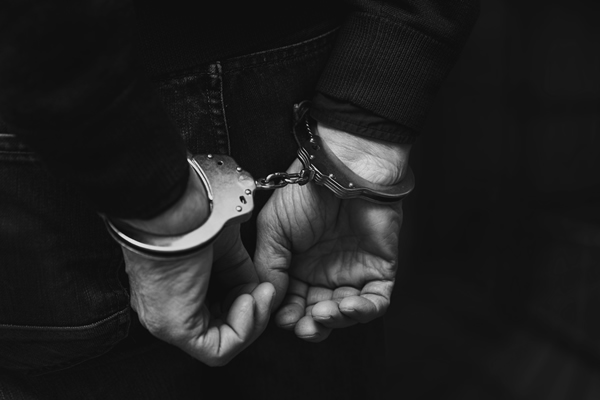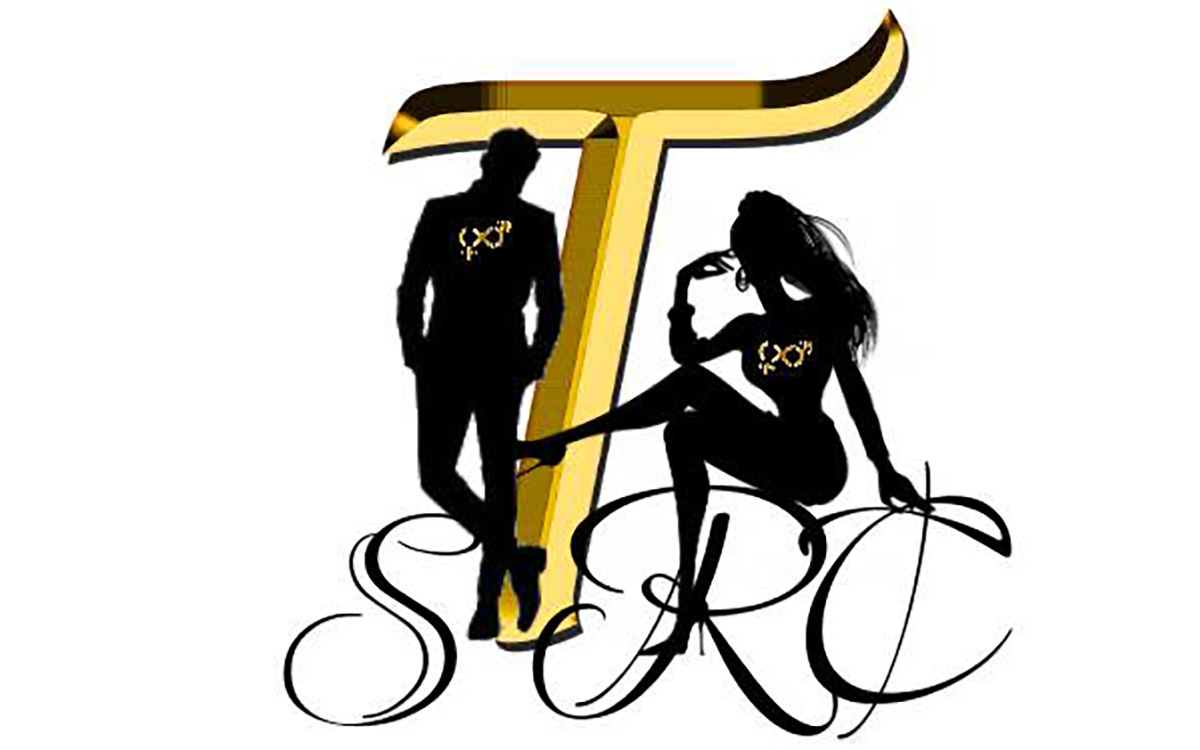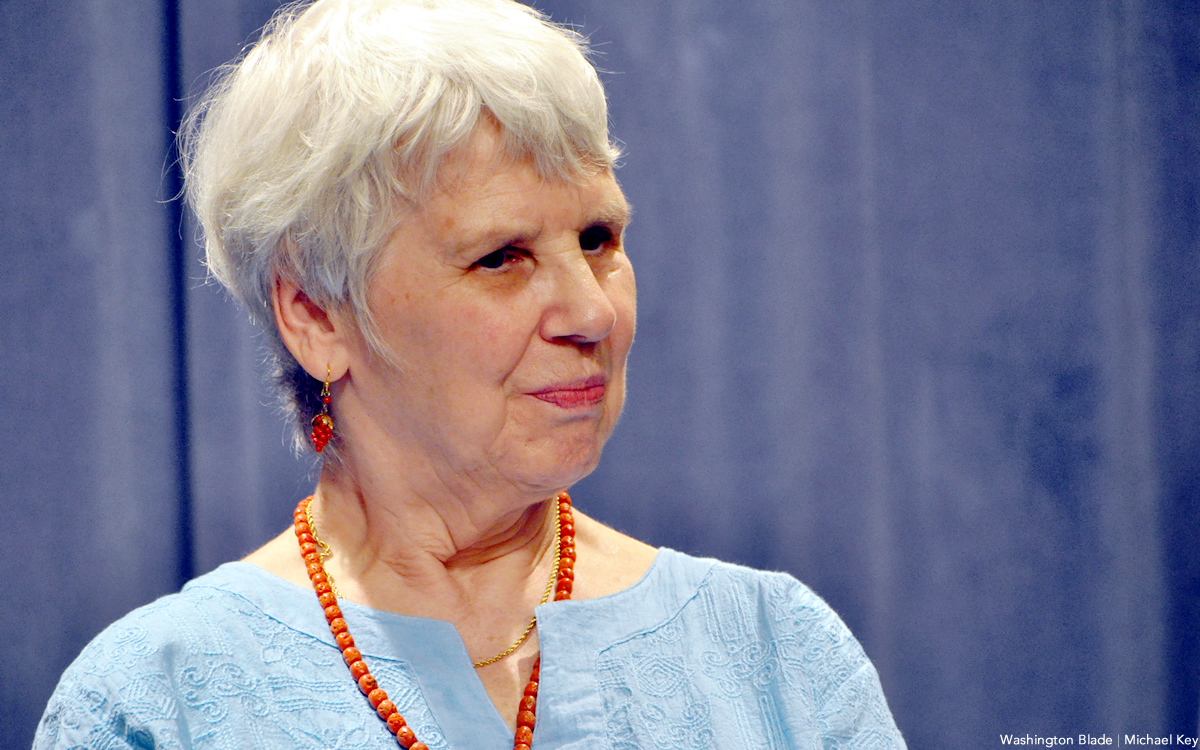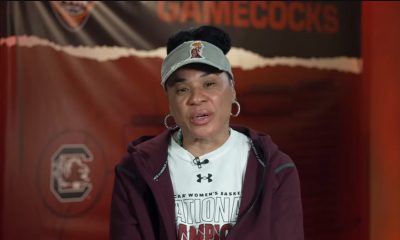Local
Gay men arrested under Md. sodomy law in adult bookstore raid
Attorney says prosecutors enforcing unconstitutional measure

Harford County, Md., Sheriff’s Office deputies arrested four men on a charge of Perverted Sexual Practice under the state’s sodomy law during a May 20 raid on the Bush River Books & Video store in the town of Abington, located 25 miles north of Baltimore.
A statement released by the Sheriff’s Office to the Washington Blade, at the Blade’s request, says a total of nine arrests were made during the May 20 “operation,” which the statement says was prompted by complaints about the adult store by nearby residents and some of its patrons.
According to the statement, among the nine men arrested, three were charged only with Perverted Sexual Practice, one was charged with Perverted Sexual Practice and Indecent Exposure, four were charged only with indecent exposure, and one was charged with Solicitation of Prostitution.
A friend of one of the arrested men told the Blade that his friend rented one of the store’s private video rooms and was with another male friend inside the room when sheriff’s deputies “in full riot gear unlocked his room and arrested him and his friend” on a charge of indecent exposure.
“They spent the night in jail and were badly treated,” said the friend who spoke with the Blade.
A sign on the outside of the Bush River Books & Video store says the store has four theaters on its premises. Sources familiar with the store have said it also charges a fee to rent small video rooms with doors that lock from the inside, where adult videos can be viewed on small video screens.
The store’s owner did not respond to a request by the Blade for comment.
Attorney Greg Nevins, who serves as senior counsel for the national LGBTQ litigation organization Lambda Legal, said the 2003 U.S. Supreme Court decision known as Lawrence v. Texas struck down state sodomy laws like the Maryland law as unconstitutional pertaining to consenting adults in a private setting.
Aside from the Supreme Court ruling, the Maryland General Assembly last year approved legislation repealing the state’s sodomy law known as the Maryland Unnatural or Perverted Sexual Practice Act.
But Nevins said the online legal reference site WestLaw, which keeps track of state laws throughout the country, shows that the Maryland Perverted Sexual Practice Act was still on the books, leading him to speculate that only part of the law may have been repealed.
The Maryland General Assembly is currently in recess and the Blade couldn’t immediately reach a spokesperson for lawmakers who worked on the repeal bill to confirm whether all or just part of the sodomy law was repealed.
Nevins said a subsequent ruling in 2013 handed down by the U.S. Court of Appeals for the 4th Circuit, which includes Maryland and Virginia, reconfirmed the Supreme Court’s Lawrence decision. He said the 2013 ruling “declared that all laws that have as their only element the act of oral or anal sex are facially unconstitutional” and should not be enforced under circumstances similar to the Maryland bookstore arrests.
“There are cases around the country discussing whether certain areas are private, usually focusing on whether the participants had a reasonable expectation of privacy,” Nevins said. He noted that the Supreme Court’s Lawrence decision and subsequent appeals court rulings have considered claims by police and prosecutors that court rulings overturning sodomy laws should not be interpreted to allow sexual activity in public places.
But Nevins said a strong legal case could be made that a private video room with a locked door such as the ones at Bush River Books and Video store should hold the same degree of presumed privacy as that of a rented hotel room.
A spokesperson for Harford County State’s Attorney Albert J. Peisinger, who serves as the county’s lead prosecutor, said his office would have no comment on whether prosecutors or the Sheriff’s Office have legal authority to make arrests and prosecute cases on the charge of Perverted Sexual Practice if that statute was repealed or struck down as unconstitutional.
“It is the policy of this office to make no comment on pending matters of investigations, including any underlying legal theories,” said spokesperson Gavin Patashnick. “That said, I would be happy to have a more substantive discussion regarding the bookstore once these cases have concluded,” he said.
Patashnick also declined to say whether his office dropped charges against two of the nine men arrested in the bookstore raid, whose cases could not be found in the online court records for the Harford County District Court, where the cases for six of the nine arrested men have appeared.
Of the six cases the Blade found in the online court records, just one was for the charge of Perverted Sexual Practice. The court records show that each of the six men whose cases were found in the online records, including the man charged with Perverted Sexual Practice, were scheduled to go on trial on Aug. 2 for their respective charges, which are misdemeanors.
Bradley Clark, an attorney for the Harford County Public Defender’s office who is representing one of the arrested men charged with indecent exposure, told the Blade that arrests of defendants that do not appear in the public court records usually indicate the case was dropped by prosecutors or dismissed by a judge.
Clark agreed with Nevins that the men charged in the bookstore raid with Perverted Sexual Practice should have a strong legal case to challenge the arrests under the Lawrence Supreme Court ruling and other court rulings declaring sodomy laws unconstitutional.
The statement released to the Blade by Harford County Sheriff’s Office spokesperson Kyle Andersen, in contrast to the State’s Attorney’s office, provided considerable details in support of the arrests.
“In the past several months, we have received an increased number of concerns and allegations of a wide variety of illegal activity occurring at Bush River Books and Video in the 3900 block of Pulaski Highway in Abingdon from citizens and patrons of the business,” the statement says.
“We take all citizen concerns seriously, and there is an active investigation into these concerns,” the statement continues. “Recently, members of our Special Operations Division have taken part in a handful of operations at that location, in an attempt to curb these illegal activities. On May 20, 2021, such an operation occurred,” it says.
“During that operation, an undercover deputy entered the premises and observed a variety of illegal sexual activities that were occurring on the premises,” the statement says. “Additionally, an additional undercover female deputy was approached and solicited for prostitution. At the conclusion of the operation, nine individuals were charged,” the statement concludes.
An online search using the name of the Bush River Books and Video store leads to media reports, including a January 2012 article in the Baltimore Sun, showing the store has been the target of law enforcement crackdowns for at least a decade. The 2012 Sun story reports that a Catholic priest was among the men arrested at the store during one of the 2012 Sheriff’s Office raids.
A search by the Blade also led to an online petition posted on the Change.com website calling on Harford County Executive Barry Glassman and the Harford County Council to “shut down” Bush River Books and Video store on grounds that “illegal activity” takes place there.
“We are asking the county to charge the owners of the store with the crimes that are being allowed to continue there, and to shut down this nuisance to our neighborhood,” said Abingdon resident Heather Cantos, who states in the web posting that she started the petition.
One of the arrested gay men, who spoke to the Blade on condition that he not be identified, said he was aware that the store has been the subject of law enforcement crackdowns in the past.
“But, you know, I went inside and was hooking up with someone and the next thing I know, eight of us were against the wall with handcuffs with plastic zip ties on them,” he said. “And we all spent the night in jail. I was released at like six o’clock in the morning,” he said.
He added, “I don’t know why people have a problem with this. We go there to meet people like us.”
Jeremy LaMaster, executive director of the Maryland statewide LGBTQ advocacy group Free State Justice, said he was not aware of the Bush River Books & Video arrests until contacted about the arrests by the Blade. He said Free State Justice would consider what, if any action, the organization might take in response to the reports that gay men were being arrested and prosecuted on sodomy related charges.
Upper Chesapeake Bay Pride, an organization that, according to its website, “provides unwavering advocacy and support for queer (LGBTQIA+ people, communities, and their families in Cecil and Harford counties,” did not reply to messages left by the Blade seeking comment on the arrests of gay men at the adult bookstore.
Virginia
Norfolk transgender resource center vandalized
Anti-trans graffiti spraypainted onto Southeastern Transgender Resource Center’s windows

The Norfolk Police Department is investigating the vandalism of a transgender resource center’s building.
Tarena Williams, founder of the Southeastern Transgender Resource Center, told WAVY that someone spraypainted anti-trans graffiti on the windows of her organization’s offices on Sunday or Monday morning. Williams told the Hampton Roads television station that seeing the messages was like “walking into hell.”
“I opened up STRC, even the Lamina House,” she told WAVY. “I opened up that to get away from those types of words. This is a place you can come to get away from that, but to see that sprayed over the window. It’s kind of like you are walking into hell. … To be honest, I was like in shock.”
Authorities are investigating the vandalism.
West Virginia
Appeals court strikes down W.Va. transgender athlete ban
Ruling finds law violates students’ constitutional rights, Title IX

BY LORI KERSEY | The 4th U.S. Circuit Court of Appeals has struck down West Virginia’s ban on transgender athletes, finding the law violates trans students’ rights under the Equal Protection Clause of the constitution and Title IX, a federal civil rights law prohibiting discrimination based on sex in education programs.
The case, B.P.J. vs. the West Virginia Board of Education, was filed in May 2021 on behalf of Becky Pepper-Jackson, a 13-year-old trans middle school student and track athlete who would be barred from participating if the ban is upheld. Pepper-Jackson is represented by the American Civil Liberties Union, the American Civil Liberties Union of West Virginia and Lambda Legal.
In April 2021, West Virginia Gov. Jim Justice signed into law a bill prohibiting trans women and girls in the state from participating in sports that align with their gender identity. The U.S. Court of Appeals in February 2023 blocked the state from removing Pepper-Jackson from her school’s track and field team as legal advocates appealed a lower court’s ruling upholding the ban.
In Tuesday’s ruling, Judge Toby Heytens wrote that offering Pepper-Jackson the “choice” between not participating in sports and participating only on boys teams is not a real choice.
“The defendants cannot expect that B.P.J. will countermand her social transition, her medical treatment, and all the work she has done with her schools, teachers and coaches for nearly half her life by introducing herself to teammates, coaches and even opponents as a boy,” the judge wrote.
“By participating on boys teams, B.P.J. would be sharing the field with boys who are larger, stronger, and faster than her because of the elevated levels of circulating testosterone she lacks,” he wrote. “The Act thus exposes B.P.J. to the very harms Title IX is meant to prevent by effectively ‘exclud[ing]’ her from ‘participation in’ all non-coed sports entirely.”
In a statement Tuesday, Joshua Block, senior staff attorney for the ACLU’s LGBTQ and HIV Project, called the court’s ruling “a tremendous victory for our client, transgender West Virginians and the freedom of all youth to play as who they are.”
“It also continues a string of federal courts ruling against bans on the participation of transgender athletes and in favor of their equal participation as the gender they know themselves to be,” Block wrote. “This case is fundamentally about the equality of transgender youth in our schools and our communities and we’re thankful the 4th Circuit agreed.”
“We hope today’s ruling sends a message of hope to the trans youth of West Virginia,” Aubrey Sparks, legal director of the ACLU of West Virginia, said in the statement. “And a message of warning to politicians who continue to dehumanize this vulnerable population.”
West Virginia is one of 21 states that have banned trans student-athletes over the last three years, according to the ACLU.
In a statement Tuesday, West Virginia Attorney General Patrick Morrisey vowed to defend the ban and said he is “deeply disappointed” in the decision.
“The Save Women’s Sports Act is ‘constitutionally permissible’ and the law complies with Title IX,” Morrisey said. “I will keep fighting to safeguard Title IX. We must keep working to protect women’s sports so that women’s safety is secured and girls have a truly fair playing field. We know the law is correct and will use every available tool to defend it.”
******************************************************************************************

Lori Kersey is a reporter with a decade of experience reporting in West Virginia. She covers state government for West Virginia Watch.
******************************************************************************************
The preceding article was previously published by the West Virginia Watch and is republished with permission.
Nonprofit, nonpartisan, independent journalism not hidden behind a paywall. Mountaineers are always free, and so is West Virginia Watch.
West Virginia Watch is part of States Newsroom, the nation’s largest state-focused nonprofit news organization.
District of Columbia
Reenactment of first gay rights picket at White House set for April 17
Event marks 59th anniversary of historic push for gay rights in nation’s capital

D.C.’s Rainbow History Project announced it will hold a reenactment on Wednesday, April 17, of the historic first protest for gay rights in the form of a picket line in front of the White House that took place on that same day in 1965.
In a statement released last week, Rainbow History Project says the reenactment will mark the 59th anniversary of an event that is credited with bringing attention for the first time to the federal government’s longstanding discrimination against a minority group referred to then as homosexuals or gays and lesbians.
The statement notes that the 1965 event was organized by the Mattachine Society of Washington, D.C., the first politically active LGBT organization in the nation’s capital founded by local gay rights pioneer Frank Kameny.
“The picket took place on the White House sidewalk, Lafayette Park, 1600 Pennsylvania Ave., on April 17, 1965,” the statement says. “For exactly one hour, from 4:20 p.m. to 5:20 p.m., members of the Mattachine Society of Washington walked in a circle, non-stop, in silence, carrying posters of their demands,” the statement continues.
“The White House picket is the origin story for public demonstrations for gay rights in the U.S., and the origin story for Pride Marches and the annual LGBTQ Pride celebrations which occur across the globe,” according to the statement.
It says those picketing in the April 1965 event, which included Kameny and longtime local D.C.-area lesbian activist Lilli Vincenz, both of whom held doctorate degrees, called on the government to adopt the Mattachine Society of Washington’s four major demands: an end to the exclusion of homosexuals from federal government employment; an end to the ban on gays and lesbians from serving in the U.S. military; an end to the “blanket denial” of security clearances for gay people; and an end to the “government refusal to meet with the LGBTQ community.’
Among those who chose not to respond to the request for a meeting was President Lyndon B. Johnson, who occupied the White House at the time of the 1965 picketing.
Vincent Slatt, the Rainbow History Project’s director of archiving and one of the lead organizers of the April 17 reenactment event, said the event is aimed, among other things, at drawing attention to how far the LGBTQ community has come since 1965. He said the event is not in any way a protest of the administration of President Joe Biden and Vice President Kamala Harris, who Slatt called staunch supporters of the LGBTQ community.
“We are just reenacting this historical event and pointing out how far we’ve come,” Slatt told the Washington Blade. “If you think about what it means in 1965 when these people were protesting and LBJ would not even respond to them. And now, we are at a place where Vice President Harris speaks on a stage at Capital Pride.”
The Rainbow History Project statement notes that the reenactment event will also be held in honor of Kameny, who died in 2011, and Vincenz, who passed away in 2023, both of whom participated in a similar reenactment event in 2008.
Among those who will be participating in this week’s reenactment on April 17 will be longtime local LGBTQ rights activist Paul Kuntzler, who is the only known surviving person who was among the White House picketers at the April 1965 event. Kuntzler will be carrying a replica of his own picket sign he held at the 1965 event, the statement says.
It says Rainbow History Project volunteers will also carry replicas of the original protest signs and hand out literature explaining the picket to passersby and tourists.
Similar to the 1965 event, the reenactment picketing at the White House will begin on April 17 at about 4:15 p.m., according to Slatt of the Rainbow History Project.




















